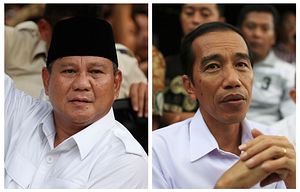Amid the tension of the Indonesian presidential elections, leading candidate Joko Widodo has declared that he will donate campaign funds to aid civilians in the Palestinian territories.
The death toll in Gaza continues to rise, nearing 340 in the wake of Israeli airstrikes and now a ground invasion.
Widodo’s running mate Jusuf Kalla initially announced the decision, saying that once the elections are over, the Widodo campaign will divert the campaign funds to help Palestinians.
Added Widodo at a press conference on July 10, “I ask all Indonesian people to pray for the Palestinian people so they are given strength, physically and mentally, to maintain their sovereignty from Israeli colonialism.”
The pledge was quickly matched by Jokowi’s rival, Prabowo Subianto, who promised at a Palestinian solidarity rally the following day 1 billion rupiahs ($85,700) to aid Palestine.
“We’ll prepare medical and humanitarian volunteers to help people who are being attacked,” Subianto said.
This convergence of the Indonesian presidential elections and the humanitarian crisis in Gaza provides a unique opportunity to dissect the global and local impacts of the evolving relations between two prominent states in the Muslim world.
Indonesia is among the 138 United Nations General Assembly member states that accorded Palestine non-Member Observer State status in the UN. Indonesia has no formal diplomatic relations with Israel.
The Muslim-majority country’s more than 240 million citizens traditionally express sympathy with the plight of the Palestinians. Videos and pleas for aid to Palestinians peppered the internet and social media in Indonesia amid the febrile post-election period over the past week.
It is perhaps unsurprising, then, that pledges to aid Palestine abound. The candidates’ promises are in line with the current Indonesian government’s stance. Coordinating Minister of Politics, Law, and Security Djoko Suyanto has announced that the Indonesian government has pledged assistance of $1 million to Palestine.
“The form of that [assistance] will be negotiated by the Ministry of Foreign Affairs and the Palestinian Embassy in Jakarta,” explained Djoko at a press conference last week.
However, the donation pledges coming from Widodo and Subianto are noteworthy – one of the two will be the next leader of the world’s largest Muslim nation.
Taking into account the current state of global attitudes vis-à-vis the Israel-Palestine conflict, most glaringly the U.S. and Europe’s non-intervention, which effectively provides tacit support to Israel’s military campaigns in Gaza, Indonesia’s presidential candidates are signaling a commitment to strengthening the Southeast Asian nation’s engagement with Palestine.
Widodo and Subianto have both condemned Israel’s military action.
“The Israeli attack on Gaza that killed dozens of Palestinians and injured hundreds of others is a violation against human rights. The situation there is very disturbing as genocide has taken place,” Widodo said.
Subianto, meanwhile, held a special rally on July 11 to condemn Israel’s attacks where he, too, denounced the bombardment of Gaza as “against humanity.”
During the presidential debates on June 22, Widodo made clear his support for Palestinian independence.
“We support the independence of Palestine because our Constitution states that independence is a right of all nations,” Widodo again stressed at a campaign speech in West Kalimantan on June 23.
His campaign has further promised to open an Indonesian embassy in Palestine if Widodo is elected, arguing that it is important for Indonesia to support Palestine, since Palestine was part of the Arab League that supported and recognized Indonesia’s independence.
This stance also echoed by Subianto at his rally for Palestine. He, too, supports sovereignty for Gaza and the West Bank. Subianto wore a scarf featuring the Palestinian and Indonesian flags to underline his stance on Palestinian statehood and independence.
The pledges of money are also significant because, in the case of Widodo, the donation will come from funds given by supporters to fund his presidential race.
Widodo has been the first Indonesian presidential candidate to solicit campaign contributions directly from the public. The funds are channeled through three official bank accounts and are reported to the General Elections Commission (KPU).
The campaign has amassed a total of around 300 billion rupiahs ($26 million) in campaign funds, in part from crowdfunding.
While the approach was initially harshly criticized by the opposing camp, with some accusing him of “begging” or even exploiting his supporters, the crowdfunding method has now been generally embraced. Subianto soon opened his own crowdfunding bank account.
The decision, however, to allocate this money away from its initial purpose raises interesting questions about crowdfunding, the responsibility that is attached to managing funds donated by citizens, as well as its implications on evolving modes of civic participation.
In fact, many of Widodo’s supporters have appealed to the campaign to help Gaza, even using campaign funds. It is evidence of the influence that an average citizen, donating a humble sum to the campaign, can have on foreign policy position.
This election has seen many milestones for Indonesia, among them the unprecedented enthusiasm, public interest, and political debate.
Going forward, as methods like crowdfunding, online petitions, and political mobilization via social media take on bigger roles, Indonesia’s citizens may well see grassroots participation as a way to empower themselves, including with a direct voice in foreign policy.
Aria Danaparamita is a journalist and former Freeman Asian Scholar at Wesleyan University.

































